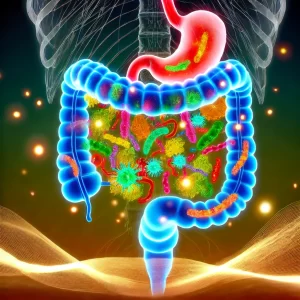The Gut Microbiome: How It Impacts Your Overall Health
The gut microbiome has been one of the most exciting areas of research in recent years, and it's no surprise why. Our understanding of the trillions of microorganisms living in our digestive system has exploded, revealing their profound influence not only on digestive health but also on overall wellness. The gut microbiome affects everything from digestion and immunity to mental health and even chronic diseases. In this blog, we’ll explore what the gut microbiome is, how it functions, and why maintaining a healthy balance is essential for your overall health.


What is the Gut Microbiome?
The gut microbiome refers to the complex ecosystem of microorganisms, including bacteria, viruses, fungi, and other microbes, that reside in the digestive tract. Most of these microorganisms live in the large intestine and play a vital role in various bodily functions.- Bacteria: The most researched component, particularly in terms of its role in digestion, immunity, and protection against harmful bacteria.
- Viruses & Fungi: Less studied but also play important roles, such as regulating bacterial populations and influencing immunity.
- Diversity: A more diverse microbiome is generally healthier, with a balance between “good” bacteria (like Lactobacillus) and “bad” bacteria kept in check.

How Does the Gut Microbiome Affect Digestive Health?
1. Aiding Digestion and Nutrient Absorption The gut microbiome helps break down complex carbohydrates, fibers, and proteins that our digestive enzymes cannot handle on their own. By fermenting fiber, bacteria in the colon produce short-chain fatty acids (SCFAs), which play a key role in keeping the colon healthy and providing energy to the body.- Example: Bacteria like Bacteroides and Firmicutes help digest fibers and contribute to the production of essential vitamins like Vitamin K and some B vitamins.
- Example: Probiotic bacteria, like Lactobacillus and Bifidobacterium, can suppress harmful pathogens like Clostridium difficile, which can cause severe gastrointestinal infections.
- Irritable Bowel Syndrome (IBS): Dysbiosis has been linked to IBS, with symptoms like bloating, diarrhea, and abdominal pain being tied to an imbalance of gut bacteria.
- Inflammatory Bowel Disease (IBD): An imbalance in gut bacteria is thought to trigger immune responses that lead to inflammation in the gut, contributing to conditions like Crohn’s disease and ulcerative colitis.
The Gut Microbiome and the Immune System
About 70% of the body’s immune system resides in the gut, and the microbiome is intimately connected to it. The bacteria in your gut communicate with immune cells, helping to control the body’s response to infections.- Boosting Immunity: Certain gut bacteria help train the immune system, teaching it to differentiate between harmful invaders and the body’s own tissues, reducing the risk of autoimmune diseases.
- Preventing Inflammation: A healthy gut microbiome keeps the intestinal lining strong and prevents harmful substances from passing into the bloodstream, a phenomenon known as “leaky gut.” When the gut barrier is compromised, inflammation can occur, leading to systemic immune responses.
The Gut-Brain Axis: How the Microbiome Affects Mental Health
The connection between your gut and brain, known as the gut-brain axis, is another crucial aspect of the microbiome's impact on overall health. This bidirectional communication pathway links emotional and cognitive centers of the brain with peripheral intestinal functions.- Serotonin Production: About 90% of the body’s serotonin, a neurotransmitter that regulates mood and anxiety, is produced in the gut. Gut bacteria influence serotonin production, affecting mood regulation and potentially playing a role in conditions like depression and anxiety.
- Mental Health Disorders: Studies have shown that imbalances in gut bacteria may be associated with anxiety, depression, and even autism. This has led to research into using probiotics ("psychobiotics") to improve mental health.
The Role of the Gut Microbiome in Metabolism and Weight Management
The composition of your gut microbiome can affect how your body metabolizes food, potentially influencing weight gain, insulin resistance, and obesity. Certain bacteria are more efficient at extracting energy from food, which may contribute to weight gain if these bacteria are overrepresented.- Weight Gain: Studies have found that people with obesity tend to have lower microbiome diversity and a different ratio of bacterial species, such as an increase in Firmicutes relative to Bacteroidetes.
- Blood Sugar Regulation: A healthy gut microbiome can help regulate blood sugar levels by influencing insulin sensitivity, reducing the risk of type 2 diabetes.

How to Maintain a Healthy Gut Microbiome
Maintaining the right balance in your gut microbiome is crucial for overall health. Here are some proven strategies to promote a healthy gut: 1. Eat a Diverse Range of Foods A varied diet rich in whole foods and fibers promotes microbial diversity, which is essential for a healthy gut. Include fruits, vegetables, whole grains, and legumes in your diet to feed beneficial bacteria.- Prebiotic Foods: Garlic, onions, asparagus, and bananas contain fibers that nourish beneficial gut bacteria.
- Sources of Probiotics: Yogurt, kefir, sauerkraut, kimchi, and miso.

